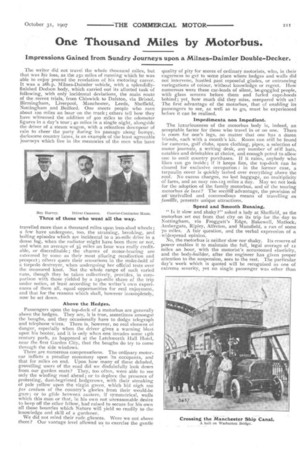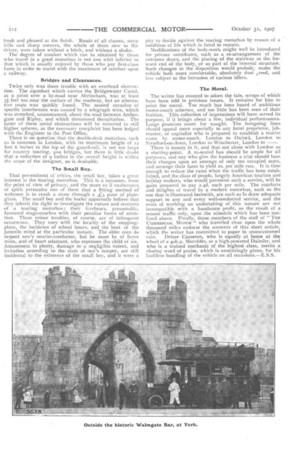One Thousand Miles by Motorbus.
Page 17

Page 18

If you've noticed an error in this article please click here to report it so we can fix it.
Impressions Gained from Sundry Journeys upon a Milnes-Daimler Double-Decker.
The writer did not travel the whole thousand miles, but that was his loss, as the 25o miles of running which he was able to enjoy proved the revelation of his motoring career. It was a 28h.p. Milnes-Daimler vehicle, with a splendidlyfinished Dodson body, which carried out its allotted task of following; with only incidental deviations, the main route of the.recent trials, from Chiswick to Dalston, via Bristol, Birmingham, Liverpool, Manchester, Leeds, Sheffield, Nottingham and Bedford. One meets people who rave about too miles an hour on the track ; others tell how they have witnessed the addition of 400 miles to the odometer figures in a day's tour ; 41) miles in a single night, alongside the driver of a steam wagon, with a relentless downpour of rain to cheer the party during its passage along bumpy, darksome country lanes, is an example of the least agreeable journeys which live in the memories of the men who have travelled more than a thousand miles upon iron-shod wheels ; a few have undergone, too, the straining, breaking, and boiling episodes which are incidental to a 2o-mile drive in a dense fog, when the radiator might have been there or not, and when an average•of 5;. miles an hour was really creditable, or discreditable ; the charms of motor-boating are esteemed by some as their most alluring recollection and prospect ; others quote their sensations in the stoke-hold of a torpedo destroyer, when undergoing her official tests over the measured knot. Not the whole range of such varied runs, though they be taken collectively, provides, in comparison with those yielded by a 250-mile share of the trip under notice, at least according to the writer's own experiences of them all, equal opportunities for real enjoyment, and that for the reasons which shall, however incompletely, now be set down.
Above the Hedges.
Passengers upon the top-deck of a motorbus are generally above the hedges. They are, it is true, sometimes amongst the boughs, and they occasionally have to dodge telegraph and telephone wires. There is however, no real element of danger, especially when the driver gives a warning blast upon his hooter, and it is only when one invades some 15th century park, as happened at the Letchworth Hall Hotel, near the first Garden City, that the boughs do try to come through the side windows.
There are numerous compensations. The ordinary motorcar inflicts a peculiar monotony upon its occupants, and that for miles on end. Upon how many of these deluded, grovelling users of the road did we disdainfully look down from our garden seats? They, too often, were able to see only the winding road ahead ; or to deplore the presence of protesting, dust-begrimed hedgerows, with their streaking of pale yellow upon the virgin green, which hid nigh too per centum of the country's glories from their would-be gaze; or to glide between austere, if symmetrical, walls which this man or that, in his own not unreasonable desire to keep off the other fellow, had raised to secure for his own all those bounties which Nature will yield so readily to the knowledge and skill of a gardener. We did not mind their rude glances. Were we not above them? Our vantage level allowed us to exercise the gentle
quality of pity for scores of ordinary motorists, who, in their eagerness to get to some place where hedges and walls did not intervene, hustled past reposeful glades, or entrancing variegations of colour, without knowledge or regret. Flow numerous were these car-loads of silent, be-goggled people, with glass screens before them and furled cape-hoods behind ; yet, how much did they miss, compared with us ! The first advantage of the motorbus, that of enabling its passengers to see, as well as to go, must be experienced before it can be realised.
Impedimenta non Impediunt.
The luxuriousness of the motorbus body is, indeed, an acceptable factor for those who travel in or on one. There is room for one's legs, no matter that one has a dozen friends, each with a month's kit. Room can still be found for cameras, golf clubs, spare clothing, pipes, a selection of motor journals, a writing desk, any number of stiff hats, eatables and drinkables at choice, and enough petrol to allow one to omit country purchases. If it rains, anybody who likes can go inside ; if it keeps fine, the top-deck can be cleared for exclusive occupation : in the former case, a tarpaulin cover is quickly lashed over everything ahove the roof. No excess charges, no lost baggage, no multiplicity of fares, and an easy 100-125 miles a day. May we not look for the adoption of the family motorbus, and of the touring motorbus de luxe? The second advantage, the provision of an unrivalled and commodious means of travelling en famine, presents unique attractions.
Speed and Smooth Running.
"Is it slow and shaky?" asked a lady at Sheffield, as the motorbus set out from that city on its trip for the day to Nottingham, via Froggatt's Edge, Bakewell, Matlock, Ambergate, Ripley, Alfreton, and Mansfield, a run of some 70 miles. A fair question, and the verbal expression of a widespread opinion.
No, the motorbus is neither slow nor shaky. Its reserve of power enables it to maintain the full, legal average of 12 miles an hour, with the motorist's accustomed elasticity, and the body-builder, after the engineer has given proper attention to the suspension, sees to the rest. The particular day's work which is quoted will be recognised as one of extreme severity, yet no single passenger was other than
fresh and pleased at the finish. Roads of all classes, steep hills and sharp corners, the whole of them new to the driver, were taken without a hitch, and without a shake.
The degree of comfort which can be obtained by those who travel in a good motorbus is not one whit inferior to that which is usually enjoyed by those who pay first-class fares in order to travel with the maximum of comfort upon a railway.
Bridges and Clearances.
Twice only was there trouble with an overhead obstruction. The aqueduct which•carries the Bridgewater Canal, at a point over a by-road near Altrincham, was at least 3.4 feet too near the surface of the roadway, but an alternative route was quickly found. The second occasion of specific interference was caused by a telegraph wire, which was stretched, unannounced, above the road between Ambergate and Ripley, and which threatened decapitation. The latter of these aerial obstructions will he removed to still higher spheres, as the necessary complaint has been lodged with the Engineer to the Post Office.
There is no question that the double-deck motorbus, such as is common in London, with its maximum height of 12 feet 6 inches to the top of the guard-rail, is not too large for country touring, qua bridges, but there is little doubt that a reduction of 9 inches in the overall height is within the scope of the designer, as is desirable.
The Small Boy.
That pre-eminent of critics, the small boy,. takes a great interest in the touring motorbus. This is a nuisance, from the point of view of privacy, and the more so if exuberance of spirit persuades one of them that a fitting method of
welcome is to crash a stone through a pane of plateglass. The small boy and the loafer apparently believe that they inherit the right to investigate the nature and contents of a touring motorbus ; their forebears, presumably, favoured stage-coaches with their peculiar forms of attention. These minor troubles, of course, are of infrequent occurrence. They vary with the locality of the stoppingplace, the incidence of school hours, and the bent of the juvenile mind at the particular instant. The older men do respect one's courier-conductor, but he must be of fierce mien, and of heart adamant, who represses the child of six. Amusement in plenty, damage to a negligible extent, and irritation according to the state of one's temper, are still incidental to the existence of the small boy, and it were a
pity to decide against the touring motorbus by reason of a condition of life which is fated to remain.
Modifications of the body-work might well be introduced for private omnibuses, such as a re-arrangement of the entrance doors, and the placing of the stairway at the forward end of the body, or as part of the internal structure. Such changes in the disposition would probabi: make the vehicle both more comfortable, absolutely dust iiroof, and less subject to the intrusion of curious idlers.
The Moral.
The writer has essayed to adorn the tale, scraps of which have been told in previous issues. It remains for him to point the moral. Too much has been heard of ambitious motor-coach schemes, and too little has been seen of their fruition. This collection of impressions will have served its purpose, if it brings about a few, individual performances. Large protnises count for naught. The foregoing lines should appeal more especially to any hotel proprietor, jobmaster, or capitalist who is prepared to establish a tourist route by motor-coach. London to Oxford, London to Stratford-on-Avon, London to Winchester, London to --.
There is money in it, and that not alone with London as a starting-point. A 20-seated bus should be ample for all purposes, and any who give the business a trial should base their charges upon an average of only ten occupied seats, and arrange their fares to yield 25. per mile run. It is time enough to reduce the rates when the traffic has been established, and the class of people, largely American tourists and holiday makers, who would patronise such a service, will be quite prepared to pay 2.4d, each per mile. The comforts and delights of travel by a modern motorbus, such as the one that is illustrated herewith, are such as to draw adequate support to any and every well-conducted service, and the costs of working an undertaking of this nature are not incompatible with a handsome profit, as the result of a season traffic only, upon the schedule which has been outlined above. Finally, those members of the staff of "THE COMMERCIAL MOTOR" who travelled close upon the whole thousand miles endorse the contents of this short article, which the writer has committed to paper in unaccustomed vein. Driver Cameron, who is equally at home at the wheel of a 4oh.p. Mercedes, or a high-powered Daimler, and who is a trained mechanic of the highest class, merits a closing word of praise, which is unstintingly given, for his faultless handling of the vehicle on all occasions.—E.S.S.
























